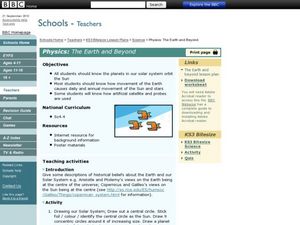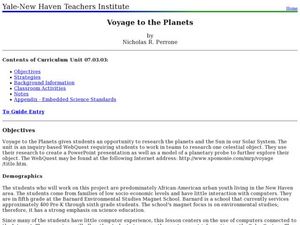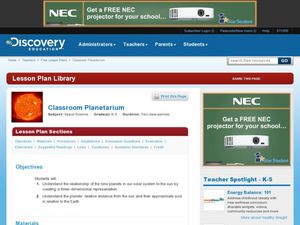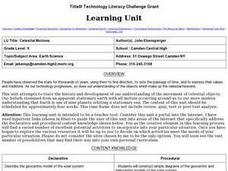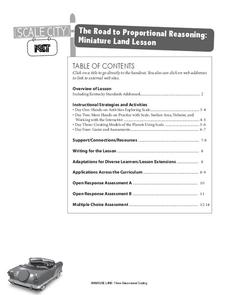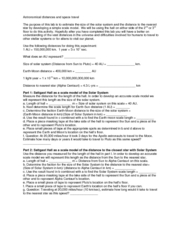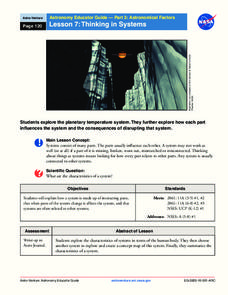Curated OER
Physics The Earth and Beyond
Fourth graders will explore our solar system. In this physics instructional activity students create a model of the solar system to explore the movement of Earth, the Sun, and stars.
Curated OER
Astronomy
Students brainstorm about what they know about the solar system. They study a planetary fact sheet and create a Venn Diagram with the information. They work in groups to examine the names of the planets and information regarding each of...
Curated OER
Voyage to the Planets
Students examine the planets in the solar system. In this planetatry lesson students complete a project using a WebQuest program.
Curated OER
Working on the Moon
Learners take a mission to the moon. In this space science lesson, students visit selected websites to discover information about Earth's moon and the solar system. Learners may take virtual missions to the moon and share information...
Curated OER
Classroom Planetarium
Students work in groups to create the planets of the solar system. In this planets lesson plan, students create a hanging solar system taking into account the size, shape and position of the planets. Students discuss the gravity on...
Curated OER
Attributes of Renewable Energy: From Nanopossibilities to Solar Power
Students explore solar energy, why we use it and how we use it. In this renewable energy instructional activity students compare active and solar techniques.
Curated OER
Strange New Planet
Students simulate different spacecraft missions using materials provided. In this space science lesson, students observe and record a planetary model's features from a distance. They relate this activity to scientists' space exploration...
Curated OER
Celestial Motions
Ninth graders complete a unit of lessons on the history of our knowledge of celestial objects. They conduct Internet research, plot the motion of a planet, construct a model of the sun's apparent motions, and create diagrams of the solar...
University of Colorado
The Jovian System: A Scale Model
Jupiter has 67 moons! As the seventh in a series of 22, the exercise shows learners the size and scale of Jupiter and its Galilean moons through a model. They then arrange the model to show how probes orbited and gathered data.
Kentucky Educational Television
The Road to Proportional Reasoning
Just how big would it really be? Young mathematicians determine if different toys are proportional and if their scale is accurate. They solve problems relating scale along with volume and surface area using manipulatives. The last day of...
Lunar and Planetary Institute
Oreo Moon Phases
Learning about the moon has never tasted delicious! Using the popular Oreo cookie as a model, young scientists carve out the cream filling to represent the different phases of the moon.
Glynn County School System
Milky Way Galaxy
There is more about the Milky Way that scientists don't know than what they do know—that leaves a lot to discover! A thorough lesson presentation explores the components of the Milky Way Galaxy and their behaviors.
Curated OER
NASA's Mars gamble pays off
Students read an article about NASA and Mars and complete short answer questions about the article. In this Mars lesson plan, students also create a scale model of the solar system.
Curated OER
Astronomical Distances and Space Travel
Students estimate the size of the solar system and the distance to the nearest star. In this space lesson students complete calculations and use Sattgast Hall as a scale model.
Curated OER
A Model of the Sun's interior
Young scholars create a three-dimensional model of the sun. In this solar system lesson plan, students design a scale model of the sun using plasticine.
NASA
Astronomy Mission Module
Yes, scientists say, there is other life in our solar system! And the best place to look is on Europa, a moon of Jupiter. Here, learners mimic the techniques scientists use to gather information about objects in our solar system, write...
Teach Engineering
Energy Resources and Systems
We've talked a lot about energy, but where does energy come from? Pupils brainstorm different energy sources through a class discussion to kick off the 14th installment of a 25-part Energy Systems and Solutions unit. They then research...
Curated OER
Energy Solutions; A Brochure
By creating an energy brochure, teams of science learners inform others about the advantages of using alternative energy sources. An instructions page for your class and a grading rubric are provided. The lesson focuses on photovoltaics,...
Curated OER
Our Amazing, Powerful Sun
Young scholars examine where energy comes from and how it can be used. In this solar energy instructional activity students explore different aspects of the sun.
Curated OER
Seasons and Cloud Cover, Are They Related?
Students use NASA satellite data to see cloud cover over Africa. In this seasons lesson students access data and import it into Excel.
Curated OER
Earth Moon Scaling
A wonderful lesson incorporating math and physics skills along with specific details about the planetary bodies. The cross-curricular approach makes for a valid activity to challenge multiple ages and abilities. Your class could work in...
Curated OER
PLANETS IN PROPORTION
Students discover scales for both the solar bodies' relative sizes and their distances from the sun. They find equatorial circumference and volumes of their solar bodies. Students apply estimation strategies and proportioanl reasoning to...
Curated OER
Stellar Lunar Curriculum
Students engage in a lesson that covers the concept of different phases of the moon. They name the cycles of the phases of the moon while using flashlights to simulate the light of the sun. They research information about several...
Curated OER
Make a Comet Model and Eat It!
Students construct a comet model based on procedure provided. In this space science lesson, students compare the physical properties of comets to the models they made. They record their observations and share them with the class.


